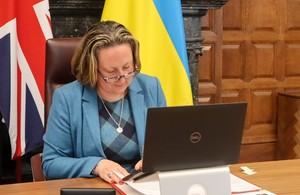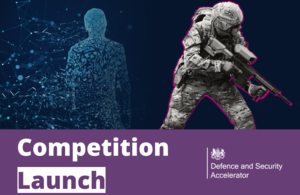Russia’s hostile information actions are frankly destabilising the international order
Many thanks indeed, Mr. Chair. And, our thanks to you and the bureau for convening this debate, and for all the work that you do to bring us together to discuss this very important issue of information.
Indeed, information and communications are critical – they shape what people know, what people believe, and often how people act. And it’s important that we should recognise that. As we marked World Press Freedom Day yesterday, more than ever, we know the importance of verified information, and the reporting of facts, as the fundamental building blocks of free societies.
Indeed, we know that good journalism and freedom to report the news accurately and without fear is critical to good governance, and so in turn, critical to realising the ideals of the Charter. Conversely, we know that the rights and responsibilities set out in the Charter die in States where the truth is obscured by state propaganda and where media freedoms are denied.
Mr. Chairman, we commend the Under-Secretary-General for her leadership and the Department’s innovations in response to the complex communications challenges facing us. We had a good discussion on this in our ad hoc seminar recently. We look forward to their stewardship of new initiatives like the Global Code of Conduct and of Integrity in Public Information, two critical projects. The increased engagement reported again this year goes hand in hand with the growing global demand for accurate, impartial and comprehensive information on the world’s most pressing issues. People are looking to the UN now more than ever as a source of trusted information.
We also want to support those in this room who have called for effective multilingualism in that work, as so ably demonstrated just now by our Armenian colleague. The UN’s communications prove that it can rise to the disinformation and misinformation challenges surrounding both the pandemic and the discourse around climate change, and we salute the work they’ve done in this area. There is an opportunity and a need to now expand those efforts to combat disinformation on crises and on conflicts.
This Committee has a duty to ensure that our guidance to the Department on Information is ready to challenge disinformation accurately and captures the reality on the ground in 2022. What is at stake is nothing less than the core principles of the Charter.
Yesterday, our Russian colleague, in response to a statement by another colleague in the room, told us that what was happening in Ukraine, and the communications around it, was not the business of this Committee. And in fact, he read to us the language from our mandate, and I just want to read what he said. He said, “I would like to remind delegates, and the colleagues which support that delegates, that the founding documents of the Committee, which we discussed today, state that its priority goals are to promote establishing a more effective and robust world order in information and communications that will inform the world and international understanding, etc.”
Now, it’s no surprise, Mr Chairman, that in reading us that mandate, our Russian colleague omitted a key part of that mandate as he read it to us, because, in fact, it says, ‘more effective world information and communication order intended to strengthen peace and international understanding’. He dropped that phrase, and he dropped it because, as we know, our Russian colleagues like to bend the truth and fit it to their own purposes.
So, Mr Chair, we will raise Russian behaviour and communications around its invasion of Ukraine because we think that its behaviour in this space is indicative of its broader approach in communications and important to the work of this committee, because since launching its illegal war in Ukraine, the Kremlin’s propaganda machine has been in overdrive. They have used hostile information operations to undermine Ukrainian sovereignty, to create false pretexts for invasion, to obscure the truth, and to hide war crimes.
And this offensive against the truth has global consequences, because Russian disinformation operations threaten to undermine public trust in both media and in public and international institutions.
Let’s look at the facts because Putin wants the truth to be yet another casualty of this conflict. The Russian government said they would not invade Ukraine. They invaded Ukraine. They said they would not target civilian infrastructure. They have remorselessly attacked residential areas, schools, and hospitals – we’ve seen this with our own eyes. They told us, in the Security Council, that Ukraine had developed bioweapons on bats and birds and lice. The UN told us that there was no evidence for this whatsoever. The Russians said they would not harm civilians. Yet, we are seeing strong evidence of war crimes, including reports of mass graves and heinous atrocities in Bucha. And our Russian counterpart, who spoke today, has even used the Security Council’s media stakeout to broadcast across the UN’s own channels an accusation that the UN was spreading disinformation about the attack on the maternity hospital in Mariupol. We all know the appalling truth of what happened to that hospital.
Mr. Chairman, the Russian statement today was typical of its broader communications technique. It was laced with innuendo, but free of facts. Now, we all need to push back against this. And this week, the UK-funded research, has exposed a large scale Russian disinformation operation using a so called ‘troll factory’ that is paid to spread lies on social media and in comment sections on news websites and social media platforms including Telegram, Twitter, Facebook, and Tik Tok. Targets included audiences in the UK, but also in South Africa, and India, and the social media accounts of various world leaders. We’ve alerted the social media platforms and international partners to this.
Our Russian colleague complains about these social media platforms. Well, there’s a reason that they don’t get to broadcast on these platforms. It’s because they have standards. For the same reason, in the UK, our organisation that looks after communications, independent to government, withdrew the broadcasting licence for RT. It’s not because we don’t like what RT says, it’s because their standards of truth fall below an acceptable standard. And, I think anyone who’s seen the broadcast news in the UK knows that our tolerance levels are pretty high. So, the troll factory is just one example, one example of many.
Russia’s hostile information actions are frankly destabilising the international order, particularly when it comes to media, and when it comes to information. We must take steps to counter this. This matters because if they succeed, then we will fail.
So, it’s our aim, Chairman, that through the work of this Committee, the leadership of DG Comms and collaboration with partners and the major platforms, we can mount a robust international response to disinformation and preserve the space for impartial and accurate reporting of the real threats and shared challenges that the UN was founded to address.
Mr. Chairman, anything less risks the very integrity of this organisation.
Thank you.

